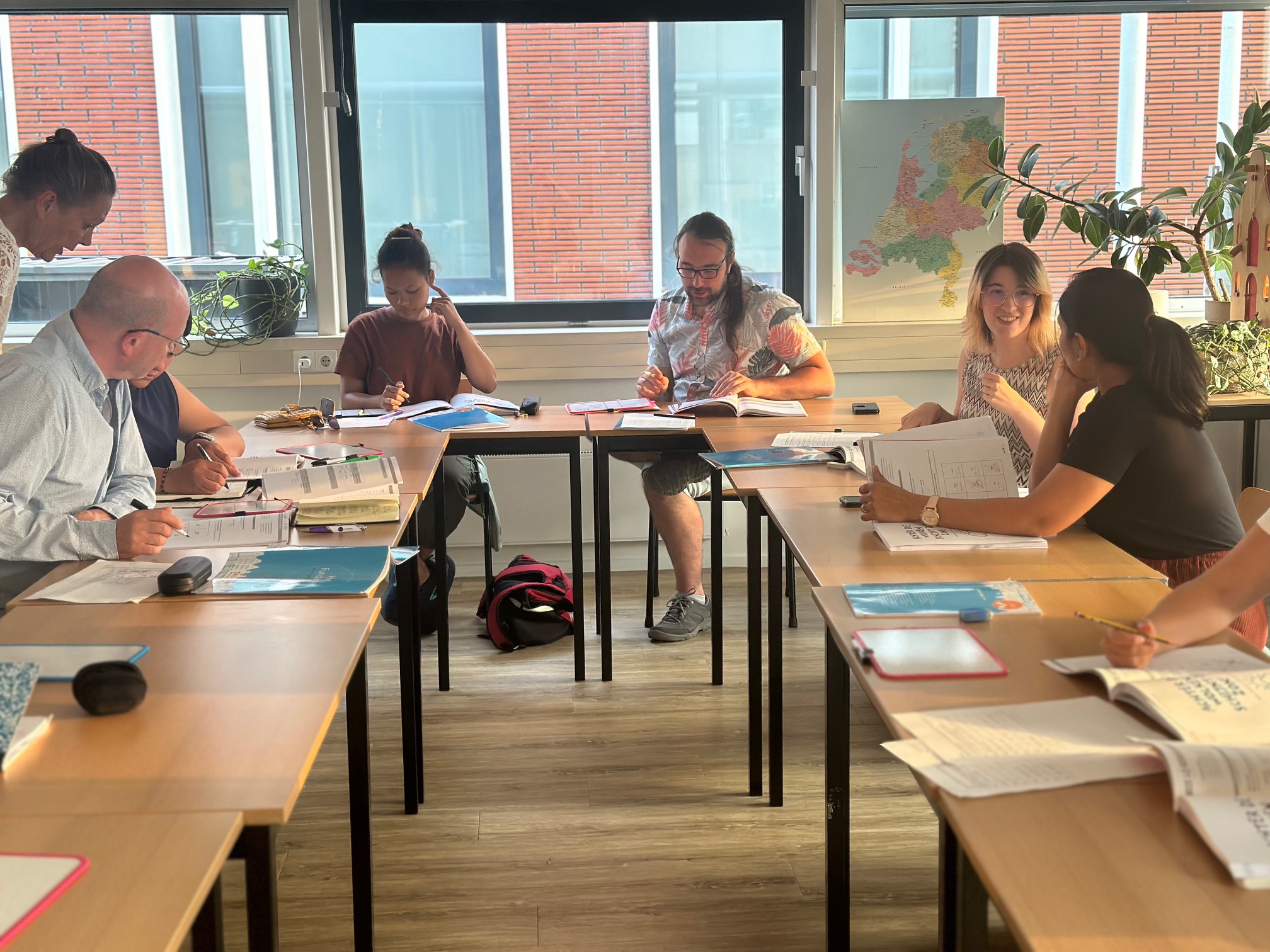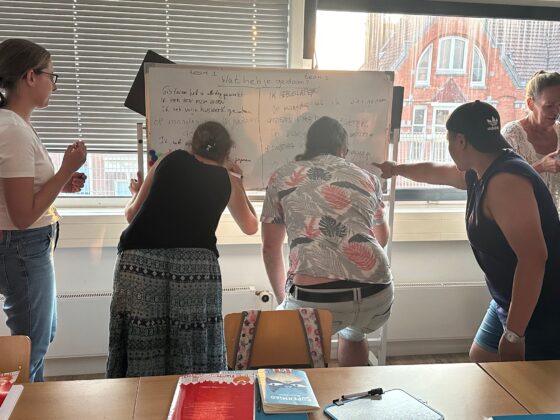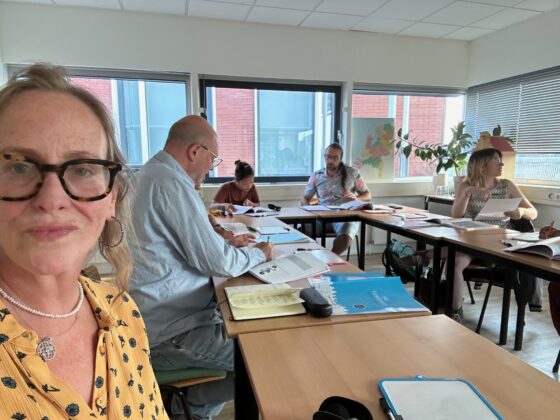Partner content
What is it really like to take Dutch language lessons?

Thinking of learning Dutch? Want to up your speaking skills? This is what to expect from a Taalthuis language class.
On a hot night in mid-August, I climbed the three stories to Taalthuis’ beginner Dutch course in Haarlem to observe a session first-hand. I needed to do it. My Dutch language ability is, let’s just say, lacking.
As I took my seat among the eight students gathered around a rectangular table, who come from Italy, Poland, Bulgaria, Indonesia, Ireland and the Philippines, teacher Annemiek Geverink starts the conversation off gently by asking students about their vacations.
It’s a personable way to start the class, using the basic Dutch question: “Wat heb je gedaan?” or “What did you do?” Soon after, the students break into groups of two to dive a little deeper into their vacation antics while practicing proper Dutch verb usage.
“I really like the small groups,” says Italian Alessandro Rembado, who is taking the class with three other Italian friends and co-workers. “It feels like the teacher really has time for every one of us, to answer any questions we might have.”
Annemiek indeed circles the class, answering questions as she goes along. Taalthuis prides itself on small, personal classes that focus on speaking skills to make students feel more comfortable talking Dutch outside the classroom.
And it does that through fun. Which is where the (many) games come in.
Fun and games
After a game of boter-kaas-en-eieren (“butter-cheese-and-eggs”, or tic-tac-toe to the English-speaking), the class divided into two groups of four to continue practicing using “Wat heb je gedaan?”
Competing against the clock, students dashed up to a whiteboard to write sentences about what they did the night before, with Annemiek awarding two points for every correct sentence and one point for those with a mistake. In these “Dutch Olympics”, as one student dubbed them, Team 1 outscored Team 2 by 13 points to 12. Although it lacked a medal ceremony, I couldn’t help but get caught up in the excitement.

“All these little games and interactions make class so engaging,” says Alessandro.
For his friend Teodora Filipova from Bulgaria, it’s Annemiek who scores the high marks. “I’m used to language teachers being quite boring, explaining all the cases,” she says. “I appreciate that our teacher, besides explaining the specific grammar, is quite good at making you understand the general environment in which to use it without being boring.”
Pedro Donald, a 59-year-old semi-retired pub owner from Belfast, Ireland who has been in the Netherlands for six months, was a bit apprehensive about taking classes because, he says, it’s been “a long time since I’ve been in a classroom, 40-plus years!”
But he persevered, wanting to learn how to communicate in basic Dutch “for good manners, if nothing else.” He finds the classes that don’t just rely on books to be relaxed and fun, and they’re starting to pay off. “I watch a lot of football, and I’m starting to understand more and more of what the commentators are saying.”
With locations in eight Dutch cities—including Amsterdam, Den Bosch, Den Haag, Utrecht and Leiden—Taalthuis caters to internationals, international students and au pairs, like 26-year-old Filipino Jolina “Star” de Guzman. She’s been living in the Netherlands since October 2023 on a cultural exchange program, with her host family supporting her Dutch language endeavours.
“If you are going to classes, sometimes you get sleepy or bored, but not with Annemiek,” says Jolina. With a Dutch partner, she plans on applying for a visa in the future and says knowing basic Dutch will be a big advantage.
Jolina will likely continue her studies at Taalthuis, which offers lessons starting at the beginner’s A1 level and goes all the way up to C1. Classes are also available online.
“Cultural gateway”
But it’s not only the Dutch language that students in Annemiek’s beginner class are taking home; it’s Dutch culture, too. “It’s really nice learning a bit of the culture while studying the language,” says Alessandro.
There was talk about the weather (who knew there are 14 different types of Dutch rain? We went through all of them), Dutch holidays and the seasons, which in the Netherlands always start on the 21st of the month, including herfst, or autumn, which Annemiek tells us there is no word in the Dutch language to rhyme with it (meant as a warning to avoid it when making your pithy poems for December’s Sinterklaas celebrations).

I appreciated that despite my years living and reporting here, I still gleaned new information from the engaging and knowledgeable Annemiek, a trained linguist.
One student asked the difference between maken (to make) and te doen (to do), with Annemiek explaining that maken is more like creating, such as making a cake or a painting, while te doen is actually doing something, such as what we all did on our summer vacations or last night.
“But what about huiswerk maken?” asks Alessandro, a reference to “housework” that uses the verb “to make” instead of “to do”.
“Well, when you clean, you are creating something,” answered Annemiek. Only the Dutch, I thought, can make a creative act out of cleanliness.
I also learned that Bevrijdingsdag, or Liberation Day, is only officially a public holiday (as in workers in the Netherlands get a paid day off) once every five years because of complaining international businesses that couldn’t cope with spring’s plethora of national holidays. (Yes, we named them, too.)
And that there is no word for boyfriend or girlfriend in Dutch, with an emphatic mijn (my) being placed before the word for friend, vriend(in) to indicate the possessive status of such a relationship.
If you want to correctly convey your relationship status or learn the 14 different types of Dutch rain (and how to correctly pronounce them), Taalthuis this year is offering a special 18-lesson Culture Course for people at about the A2 level, featuring vocabulary, grammar, recipes and even a Dutch goodie bag. Gezellig!
This feature was sponsored by Taalthuis, who invited Lauren to attend the lesson.
Thank you for donating to DutchNews.nl.
We could not provide the Dutch News service, and keep it free of charge, without the generous support of our readers. Your donations allow us to report on issues you tell us matter, and provide you with a summary of the most important Dutch news each day.
Make a donation